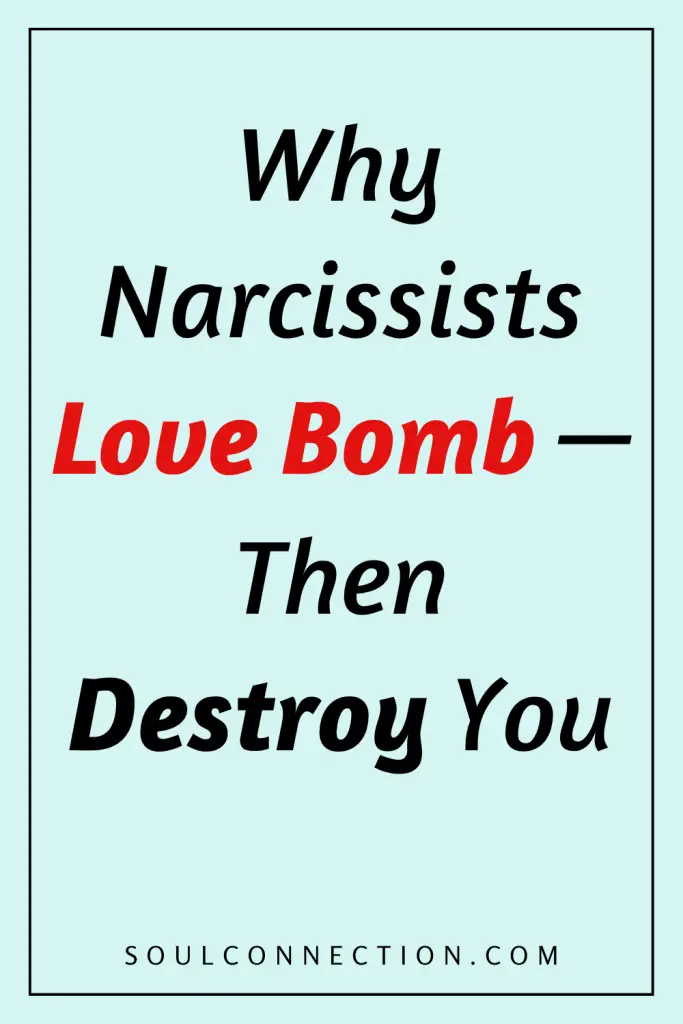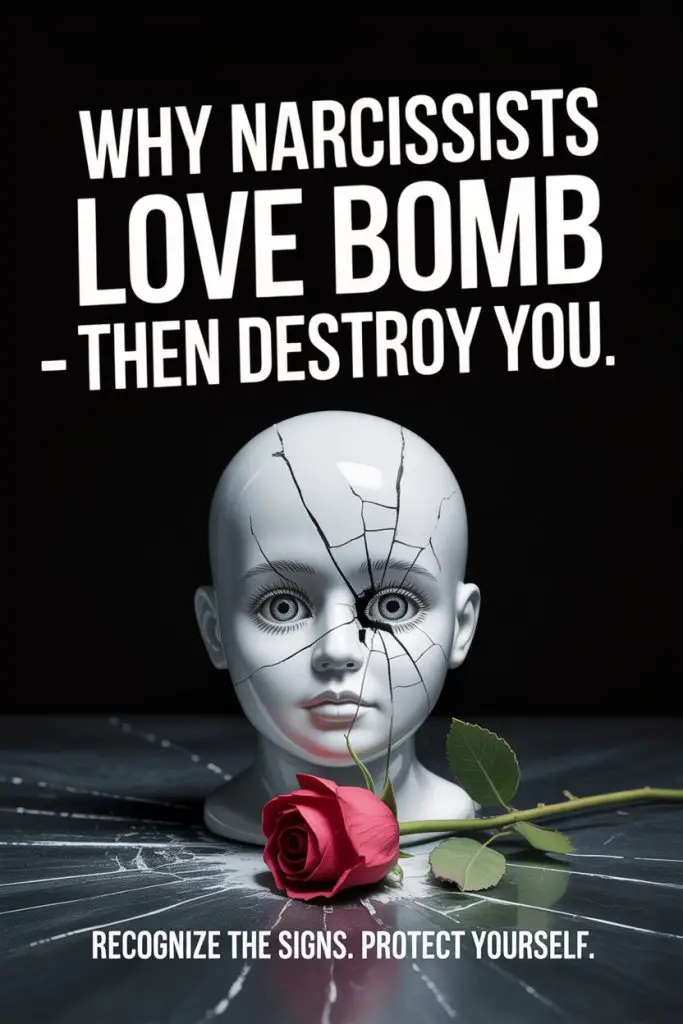If you’ve ever felt like a relationship took off at lightning speed—flowers, texts, promises, the works—and then crashed in spectacular fashion, chances are you’ve had a close encounter of the narcissistic kind.
The cycle is so textbook, psychologists could write romance novels about it (though the endings would be straight out of a horror section). Still, when you’re in the thick of it, it’s as confusing as it is exhilarating.
What is it about narcissists that makes them so skilled at love bombing—and then so determined to tear it all down?
The Narcissist’s Ego: A Hungry, Hungry Hippo
At the heart of every narcissist is an ego that’s never quite satisfied. It’s not just a garden-variety bit of self-confidence, either. We’re talking about a bottomless pit of need.
Think of it like a Tamagotchi that beeps for attention every five minutes, except this one can ruin your life.
Narcissists crave validation and admiration the way some of us crave a decent night’s sleep. They want to be adored, and they want it on tap.
Relationships aren’t partnerships in their eyes—they’re all-you-can-eat buffets of ego boosts.
What Is Love Bombing Anyway?
If you’re new to the term, love bombing is when someone showers you with attention, gifts, and affection—often right at the start of a relationship. It’s not just romantic; it’s relentless.
Good morning texts, surprise deliveries, sweeping declarations. You might feel like you’ve won the emotional lottery.
But here’s the twist: it’s never really about you.
The love bomber is more interested in how you make them feel—special, powerful, irresistible—than in actually getting to know you. The goal is to hook you fast and deep.
The Science Behind the Rush
Those early days of whirlwind romance aren’t just heady, they come with a genuine chemical rush. Dopamine, serotonin, oxytocin—your brain’s going wild, thinking it’s finally found “the one.”
Narcissists know exactly how to trigger this high. They act like your soulmate, mirroring your interests and love languages, agreeing with everything you say (at least while it suits them).
You’re not imagining those fireworks. The problem is, with narcissists, the fuse is short.
The Trap: From Idolization to Devaluation
When a narcissist love bombs, you get put on a pedestal so high you need an oxygen mask. It feels amazing—until, out of nowhere, the air gets thin.
What most people miss is that narcissists don’t actually see you as a real, complex person. You’re a character in their personal movie, there for their benefit.
The minute you reveal a flaw, have a need, or set a boundary, you stop being their fantasy. The idolization turns to devaluation—sometimes overnight.
Cue the criticism, withdrawal, and gaslighting. You’ll wonder what went wrong, when in reality, nothing did except that you stopped serving their endless appetite for validation.
Why the Sudden Switch?
So why do narcissists pull the rug out so fast?
Once the initial high of the chase fades, and you start to expect reciprocity or emotional availability, they panic. Vulnerability isn’t just uncomfortable for them—it feels threatening.
They might see your desire for connection as neediness, or your boundaries as rejection. T
he very things a healthy partner would welcome are, for a narcissist, intolerable reminders that you’re not an object, but a person with your own needs.
This sends them scrambling for control and superiority—hence the emotional destruction that follows the love bombing.
The Destruction Phase: Death by a Thousand Cuts
Destruction doesn’t usually come as a single act; it’s a slow unraveling. The affection dries up, replaced with subtle jabs, silent treatments, or outright cruelty.
The aim is to keep you off balance and hungry for the return of the love bombing days.
You may start to question your worth, your sanity, even your grip on reality. That’s not an accident. The narcissist wants you dependent on their approval, always chasing the high of their fleeting affection.
This isn’t love. It’s emotional manipulation, plain and simple.
Why Do You Fall for It?
Blame evolution—or just basic human nature. We all want to feel special. When someone comes along making you feel like you’ve just won life’s jackpot, it’s hard to stay skeptical.
Add to that the early childhood wounds most of us are quietly nursing, and you have a recipe for getting hooked.
Narcissists are experts at sniffing out people who are empathetic, eager to please, or have a soft spot for broken birds. In other words: lovely humans like you, who want a connection that goes both ways.
Can You Stop the Cycle?
Absolutely—but it takes a reality check and a healthy dose of boundaries. The key is to spot the signs before you get swept up in the fantasy.
Watch for people who move too fast, avoid emotional vulnerability, or react badly when you don’t play along with their script. If every day with them feels like Valentine’s Day, but there’s an undercurrent of neediness or entitlement, hit pause.
And if you’re already in the thick of it? Start reclaiming your space. Reconnect with friends and family, pursue interests outside the relationship, and remind yourself what real, mutual affection looks like.
Healing After the Storm
Escaping a narcissist’s orbit can feel like waking up from a strange dream—part exhilarating, part terrifying. There’s grief, confusion, and sometimes a powerful urge to run right back to the familiar (even if it was toxic).
Give yourself time. Relearn your own patterns, and notice where you’re vulnerable to flattery or grand gestures. Therapy helps, as does keeping a journal or speaking with others who’ve walked the same path.
Above all, remember: you are not broken for having fallen for the act.
Spotting Red Flags for Next Time
No one wants to build walls, but a little discernment can save you a world of heartache. Here’s what to keep an eye out for:
- Over-the-top declarations of love very early on
- Wild swings between affection and criticism
- Refusal to take responsibility for mistakes
- Pressure to isolate from friends or family
- The sense you’re always auditioning to keep their interest
If these pop up again, trust your gut. Loving relationships don’t burn you out or keep you guessing.
Rebuilding Trust in Yourself
Maybe the trickiest part after a narcissistic relationship is learning to trust your own judgment again. Gaslighting can leave you second-guessing everything from your memory to your taste in shoes.
Start small. Make decisions for yourself each day, even if it’s just what to have for breakfast. Surround yourself with people who reflect your true worth.
With time, you’ll regain your footing—and realize you’re a lot stronger than you thought.
Why None of This Is Your Fault
Narcissists make a career out of making their partners feel responsible for their bad behavior. If you’re reading this and finding familiar pain, please hear this: their choices are not your fault.
Healthy love isn’t a rollercoaster. It’s steady, sometimes ordinary, sometimes extraordinary—but never cruel.
Moving Forward with Confidence
Surviving a narcissistic relationship is no small feat. The scars are real, but so is your resilience.
The next time someone arrives in your life, dazzling and charming and promising the moon, take a breath. Ask questions, move slowly, and stay grounded in your own worth.
It may not feel as intoxicating as a love bomb, but real love is more like a good cup of tea—steady, comforting, and best sipped slowly.
Here’s to your heart, stronger and wiser than ever.


